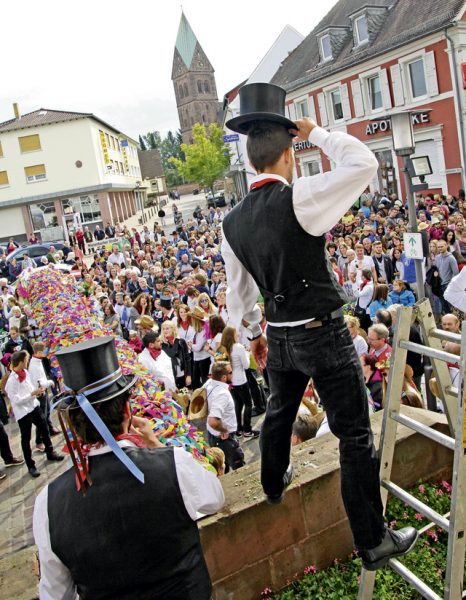
Driving through villages and towns at this time of the year, drivers might see signs and posters announcing an annual event called “Kerwe” or “Kirchweih,” which means carnival or festival.
The original word Kirchweih translated means church consecration. In the Palatinate dialect it was changed to Kerwe.
Since the third century, newly built Christian churches were consecrated in a solemn ceremony, where the priest cleansed the new church of demons. Originally Kerwe was a church celebration, which changed into a worldly event with carnivals, dance performances and other amusements.
Until the 1920s, Kerwe was, besides Christmas, the most important fest in a village. Houses and fences were painted. Children received new clothes, and women cooked and baked for relatives and other guests coming to visit the fest. Young ladies and men also used the opportunity to meet each other at these festivals and many a couple tied the knot in the following months.
Today the fest is less important in terms of relative or friend gatherings. People still cook a lot, the carnival or festival is set up on the village’s marketplace, gasthouses offer dances, and sometimes a parade goes through town. There are normally a lot of food and beverage booths, rides for kids and elders, and music on various stages ranging from traditional German tunes to pop and rock. Most towns also offer a “Frühschoppen,” a type of early morning drinking event, with lively traditional “oompa” music.
The village youth binds the traditional “Kerwestrauss,” a pole decorated with thousands of colored ribbons, which is mounted up at the local gasthaus. Here the traditional “Kerwerede,” a speech about local scandals, sensations and funny events is read in typical dialect by a good speaker standing on a ladder.
In the 16th century, Kerwe was celebrated mainly in the months of October and November. Today a lot of carnivals take place in July, August or September because of the weather. In the past Kerwe was similar to Thanksgiving with people celebrating the end of harvest.
Upcoming village festivals nearby start in Niedermohr on June 30, Trippstadt on July 8, Enkenbach on July 8, Obermohr on July 21, and Schopp on July 27. Miesenbach on Aug. 25, Kindsbach on Aug. 25, and Sembach on Aug. 25. Alsenborn on Sept. 2, Otterberg on Sept. 2, Stadtfest Landstuhl on Sept. 8, Ramstein on Sept. 15, Weilerbach on Sept. 22, and Otterbach on Sept. 23. Also see “Unterwegs” and check your local “Amtsblatt” for further dates in individual towns.


